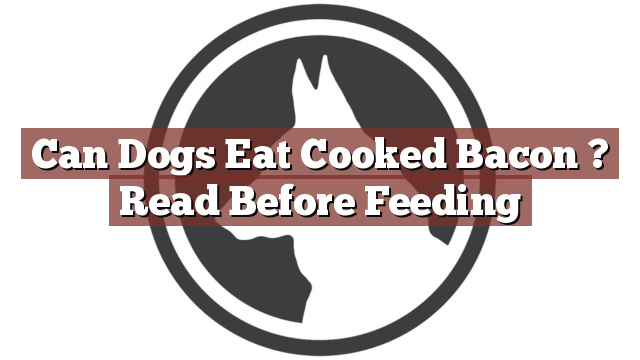Understanding Your Dog’s Dietary Needs
Before diving into the question of whether dogs can eat cooked bacon, it is essential to understand your dog’s dietary needs. Dogs are omnivores, which means their digestive system can handle both meat and plant-based foods. However, their nutritional requirements differ from humans. Dogs require a balanced diet that consists of protein, carbohydrates, fats, vitamins, and minerals.
It is crucial to feed your furry friend a diet that fulfills their nutritional needs and promotes their overall well-being. While treats can be a part of their diet, it is important to know which human foods are safe for dogs and which ones can be harmful. This brings us to the question, can dogs eat cooked bacon?
Can Dogs Eat Cooked Bacon? Read Before Feeding
Can dogs eat cooked bacon? The answer is no. While bacon may be a beloved breakfast treat for humans, it is not suitable for our canine companions. Bacon is high in fat, salt, and spices, which can lead to adverse health effects in dogs. Consuming bacon, especially in large quantities, can cause pancreatitis, a painful inflammation of the pancreas. Symptoms of pancreatitis in dogs include vomiting, diarrhea, abdominal pain, and loss of appetite.
Additionally, the high fat content in bacon can lead to obesity and can put strain on your dog’s cardiovascular system. Excessive sodium intake, as found in bacon, can also lead to dehydration and kidney problems in dogs. Therefore, it is best to avoid feeding cooked bacon to your furry friend to ensure their health and well-being.
Pros and Cons of Feeding Cooked Bacon to Dogs
When considering whether to feed cooked bacon to your dog, it is essential to look at the pros and cons. Some dog owners may argue that giving their pet a small piece of bacon as a treat occasionally is harmless. However, the cons of feeding bacon to dogs outweigh the potential benefits. While bacon may be tasty and enjoyable for your dog, the health risks associated with it simply do not justify the indulgence.
On the positive side, bacon is a good source of protein for dogs. However, there are much healthier alternatives available, such as lean meats or specially formulated dog treats. These options provide the necessary protein without the harmful effects of bacon. It is always better to prioritize your dog’s long-term health and choose nutritionally balanced options that cater to their specific dietary needs.
In Conclusion: Considerations for Feeding Cooked Bacon to Your Dog
In conclusion, it is not recommended to feed cooked bacon to your dog. Although dogs are omnivores, the high fat, salt, and spice content in bacon can lead to severe health issues. Pancreatitis, obesity, cardiovascular strain, dehydration, and kidney problems are all potential risks associated with consuming bacon. While it may be tempting to share your favorite breakfast treat with your furry friend, it is essential to prioritize their well-being by opting for healthier protein sources and specially formulated dog treats. Always consult with your veterinarian regarding your dog’s dietary needs and ensure they are receiving a balanced and nutritious diet.
Thank you for taking the time to read through our exploration of [page_title]. As every dog lover knows, our furry friends have unique dietary needs and responses, often varying from one canine to another. This is why it's paramount to approach any changes in their diet with caution and knowledge.
Before introducing any new treats or making alterations to your dog's diet based on our insights, it's crucial to consult with a veterinarian about [page_title]. Their expertise ensures that the choices you make are well-suited to your particular pet's health and well-being.
Even seemingly harmless foods can sometimes lead to allergic reactions or digestive issues, which is why monitoring your dog after introducing any new food item is essential.
The content provided here on [page_title] is crafted with care, thorough research, and a genuine love for dogs. Nevertheless, it serves as a general guideline and should not be considered a substitute for professional veterinary advice.
Always prioritize the expert insights of your veterinarian, and remember that the health and happiness of your furry companion come first.
May your journey with your pet continue to be filled with joy, love, and safe culinary adventures. Happy reading, and even happier snacking for your canine friend!

